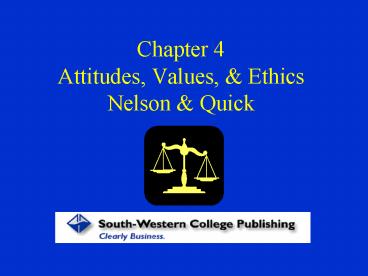Chapter 4 Attitudes, Values, - PowerPoint PPT Presentation
Title:
Chapter 4 Attitudes, Values,
Description:
ffect Physiological indicators I don't like. Verbal statements my boss. about ... Cognitive Dissonance - a state of tension that is produced. when an individual ... – PowerPoint PPT presentation
Number of Views:54
Avg rating:3.0/5.0
Title: Chapter 4 Attitudes, Values,
1
Chapter 4Attitudes, Values, EthicsNelson
Quick
2
Attitude
- Attitude - a psychological tendency expressed by
evaluating an entity with some degree of favor or
disfavor
Should poor performance be blamed on bad
attitude?
3
ABC Model of an Attitude
Component Measured by
Example
A
B
C
ognition Attitude scales
I believe my
Verbal statements boss plays
about beliefs
favorites.
M.J. Rosenberg and C. I. Hovland, Cognitive,
Affective, and Behavioral Components of
Attitude, in M.J. Rosenberg, C.I. Hovland, W.J.
McGuire, R.P. Abelson, and J.H. Brehm, Attitude
Organization and Change, 1960
4
Cognitive Dissonance
- Cognitive Dissonance - a state of tension that is
produced - when an individual
- experiences conflict
- between attitudes
- and behavior
5
Two Influences on Attitude Formation
- Direct Experience
- Social Learning - the process of deriving
attitudes from family, peer groups, religious
organizations, and culture
6
Four Processes for Social Learning through
Modeling
The learner must
- Focus on the model
- Retain what was observed
- Practice the behavior
- Be motivated
7
Attitude-Behavior Correspondence Requirements
- Attitude specificity - a specific attitude
- Attitude relevance - some self-interest
- Measurement timing - measurement close to
observed behavior - Personality factors - ex. self-monitoring
- Social constraints - acceptability
8
Work Attitudes Job Satisfaction
- Job Satisfaction - a pleasurable or positive
emotional state resulting from the appraisal of
ones job or job experience - Organizational Citizenship Behavior
- Behavior that is above and beyond duty
- Related to job satisfaction
9
Work Attitudes Organizational Commitment
Affective Commitment
Organizational Commitment The strength of an
individuals identification with an
organization
Continuance Commitment
Normative Commitment
10
Process of Persuasion
Attitude of the Target Individual
11
Process of Persuasion
Source individual influences Target
Attitude of the Target Individual
12
Process of Persuasion
Source individual influences Target
NEW Attitude of the Target Individual
13
Cognitive Routes to Persuasion
Attitude change depending on quantity of arguments
High Elaboration
Careful processing
Message
Attitude change depending on source characteristic
s or non-substantial aspects of the message
Absence of careful processing
Low Elaboration
Adapted from R.E. Petty and J.T. Cacioppo, The
Elaboration Likelihood Model of Persuasion, in
L. Berkowitz, ed., Advances in Experimental
Social Psychology, vol. 19 (New York Academic
Press, 1986) 123-205.
14
Values
- Values - enduring beliefs that a specific mode of
conduct or end state of existence is personally
or socially preferable to an opposite or converse
mode of conduct or end state of existence
15
Values
- Instrumental - values that represent the
acceptable behaviors to be used in achieving some
end state - Terminal - values that represent the goals to be
achieved, or the end states of existence
16
Work Values
- Achievement (career advancement)
- Concern for others (compassionate behavior)
- Honesty (provision of accurate information)
- Fairness (impartiality)
17
Cultural Differences in Values
Authority is a right of office and
rank
France
The Netherlands
18
Handling Cultural Differences
- Learn about others values
- Avoid prejudging
- Operate legitimately within others ethical points
of view - Avoid rationalizing
- Refuse to violate fundamental values
- Be open and above board
19
Ethical Behavior
- Ethical Behavior - acting in ways consistent with
ones personal values and the commonly held
values of the organization and society.
20
Qualities Required for Ethical Decision-making
The competence to identify ethical issues and
evaluate the consequences of alternative courses
of action
The self-confidence to seek out different
opinions about the issue and decide what is right
in terms of a situation
Tough-mindedness--the willingness to make
decisions when all that needs to be known cannot
be known and when the ethical issue has no
established, unambiguous solution
21
Individual/Organizational Model of Ethical
Behavior
Individual Influences Value systems Locus of
control Machiavellianism Cognitive moral
development
Ethical Behavior
Organizational Influences Codes of
conduct Norms Modeling Rewards and punishments
22
Values, Ethics Ethical Behavior
- Value Systems - systems of beliefs that affect
what the individual defines as right, good, and
fair - Ethics - reflects the way values are acted out
- Ethical behavior - actions consistent with ones
values
23
Locus of Control
- Locus of Control - personality variable that
affects individual behavior - Internal - belief in personal control and
personal responsibility - External - belief in control by outside forces
(fate, chance, other people)
24
Machiavellianism
- Machiavellianism - A personality characteristic
indicating ones willingness to do whatever it
takes to get ones own way
25
Cognitive Moral Development
- Cognitive Moral Development - The process of
moving through stages of maturity in terms of
making ethical decisions
Level lll Principled































